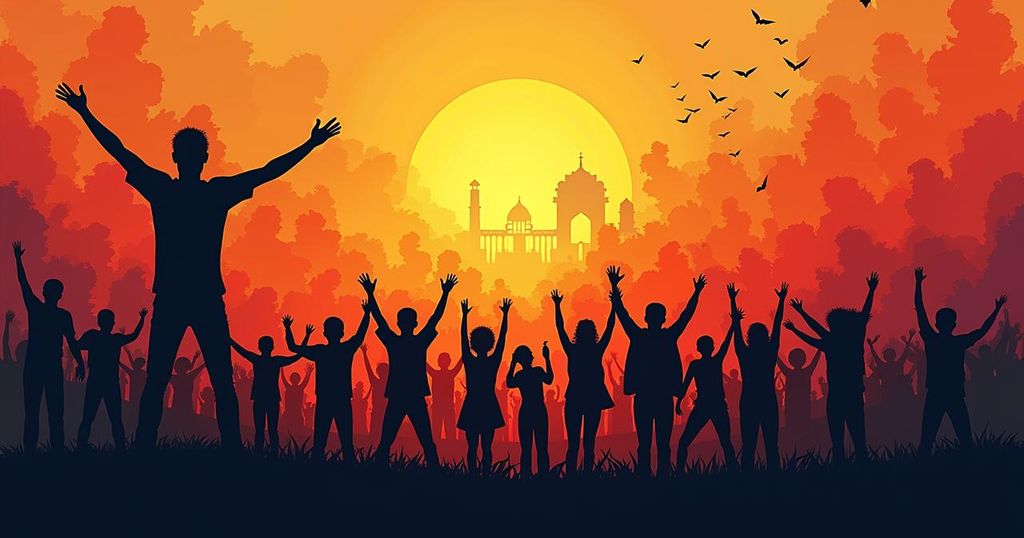A Possible Colour Revolution in Bharat
Bharat has made notable progress in recent decades but faces multifaceted security challenges exacerbated by both internal issues and external interference, particularly from Western powers. New forms of warfare, including social engineering and misinformation, are being utilized to undermine governments, creating an atmosphere ripe for civil unrest akin to historical global instances of regime change. Recommendations for counteracting these threats include enhanced public awareness, accountability for tech giants, and reforms in the justice and security sectors.
In the past seventy-seven years, Bharat has demonstrated significant advancement across various domains, despite facing substantial internal and external hurdles. As the seventh largest country by area, it is currently the most populous nation, boasting a favorable demographic profile with an average national age of 29, in contrast to 37 in China and 48 in Japan, as indicated by the World Population Prospects (2024 Revision). Bharat is not only the fifth largest economy but also the fastest-growing, poised to ascend to third place internationally within the next few years. However, it continues to grapple with intricate security challenges. The nature of modern warfare extends far beyond conventional battlefields, employing a range of kinetic and non-kinetic strategies, including social engineering, misinformation, and cyber warfare. The National Security Advisor has articulated that contemporary conflicts are increasingly waged within civil societies as opposed to solely on territorial frontiers. Social media and emerging technologies, such as artificial intelligence, have thus been weaponized to manipulate public sentiment and create divisions and discontent among citizens with the ultimate goal of destabilizing national governments. Bharat’s rising profile on the global stage and its economic momentum are continually undermined by homegrown challenges, often exacerbated by hostile external influences. The US-led coalition, motivated by its aspirations for global supremacy, has a history of dismantling governments that adopt autonomous foreign policies. This approach can be traced back to the aftermath of the Vietnam War, where direct military engagement was eschewed in favor of fostering civil disarray within targeted nations. Historical examples illustrate this phenomenon, including the ousting of leaders such as Mohammad Gaddafi of Libya and Saddam Hussein of Iraq, ostensibly under the pretext of bringing democracy to these nations, while underlying motives remained rooted in economic and geopolitical advantages. The introduction of social media algorithms aimed at promoting specific narratives further complicates the political landscape, branding dissenting opinions as authoritarian. This shift has seen a new class of revolutionaries emerge, whose intentions to unseat their governments could lead to significant turmoil. The Arab Spring and events in Europe, such as Ukraine’s Euromaidan protests, mark a trend of mass uprisings influenced by external actors. Similarly, the political upheavals in Bangladesh highlight how grassroots agitation can be manipulated by both domestic dissenters and foreign powers. Recent testimonies reveal troubling links between social media platforms and governmental pressures to suppress free speech, as exemplified in statements made by Mark Zuckerberg regarding censorship in the United States. Bharat’s internal dynamics mirror these global trends, as seen in statements from political figures drawing parallels between the Indian government’s treatment of opposition and the recent political history of Bangladesh. Billions in funding aimed at overturning nationalist governments signify an ongoing battle for ideological predominance, with various international stakeholders pursuing their interests at the expense of local stability. This complex interplay warrants immediate attention and action from policymakers. Awareness campaigns are crucial for educating the public about the methodologies employed by these anti-national forces, enabling citizens to remain vigilant and informed. Enhancing accountability within social media companies while safeguarding free speech is of paramount importance. Implementing stringent regulations governing public protests and reforming the justice system will foster a more resilient social fabric. Particular emphasis must be placed on stabilizing regions like Manipur and addressing security vulnerabilities along international borders to mitigate drug trafficking and terrorism. The broader goal must entail the consolidation of efforts across governmental agencies to eradicate terror financing and left-wing extremism, ensuring a secure and prosperous Bharat for generations to come.
The article discusses the potential for a ‘Colour Revolution’ in Bharat, exploring the socio-political landscape shaped by internal and external influences. It highlights Bharat’s demographic advantages, economic progress, and emerging security challenges within the context of global power dynamics and the manipulation of civil societies.
In conclusion, Bharat stands at a crossroads where its economic advancement and demographic potential must be defended against both internal discord and external manipulation. Proactive measures in public awareness, social media accountability, and stringent legal frameworks are crucial in addressing the challenges posed by anti-national elements. A coordinated approach among governmental entities to mitigate threats from terror financing and extremism will be essential for preserving national integrity and fostering a unified society.
Original Source: organiser.org




Post Comment